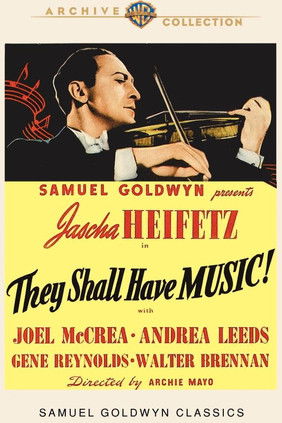The THRILL of great music... the LAUGHTER of youth... the TENDERNESS of age
"They Shall Have Music," a 1939 cinematic gem produced by Howard Productions and Samuel Goldwyn Productions, is a heartwarming tale set against the backdrop of the Great Depression in the United States. Directed by Archie Mayo, the film captures the essence of resilience and the transformative power of music. It follows the journey of a struggling music school in New York City, teetering on the brink of closure, and the unexpected arrival of a young musical prodigy, Frankie, played by Jascha Heifetz. The narrative weaves together the lives of the school's dedicated founder, played by Walter Brennan, and the students, showcasing their collective efforts to save their beloved institution. The film's charm lies in its authentic portrayal of the era's socio-economic challenges and the unifying force of music. The character of Frankie, inspired by the real-life virtuoso Jascha Heifetz, brings a touch of brilliance and hope to the struggling school. Heifetz's performance, both as an actor and a violinist, adds a layer of authenticity and emotional depth to the film. The scenes where he plays the violin are not just musical interludes but pivotal moments that drive the story forward, illustrating the profound impact of art on human lives. "They Shall Have Music" also delves into themes of community and perseverance. The students and faculty rally together, organizing a grand concert to raise funds and keep their school alive. This subplot highlights the strength found in unity and the lengths to which people will go to preserve what they love. The film's climax, featuring a riveting performance by the young musicians, is a testament to their hard work and dedication, leaving audiences inspired and uplifted. In essence, "They Shall Have Music" is more than just a film about a music school; it is a celebration of the human spirit's capacity to overcome adversity through creativity and collaboration. Produced by Howard Productions and Samuel Goldwyn Productions, this 1939 classic remains a poignant reminder of the enduring power of music and the importance of community in times of hardship.
Año1939
Duración105 minuto
GénerosFamiliaMúsicaDrama
Países de producciónUnited States of America

